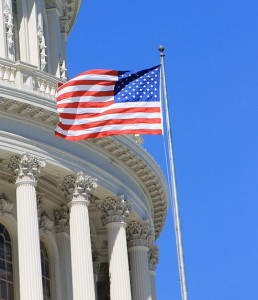Is America the Greatest Threat to World Peace?

In a recent Gallup poll, the United States was ranked number one among the list of countries posing the greatest threat to peace. AHA’s Matthew Bulger explains why.
A few months ago I wrote about the ethical and pragmatic issues with American exceptionalism in response to an article penned by Russian President Vladimir Putin that was supposed to be about Syria but mainly focused on America’s attitude towards the rest of the world.
I wrote at the time that “we must recognize the folly of promoting ourselves as a ‘special’ or ‘exceptional’ nation, because the danger of doing so is rampant nationalism and international isolation.” My reasoning behind this statement was that this nationalistic belief in our apparent uniqueness and superiority encourages us to think that we are not just a partner in the international community that helps to enforce international law, but instead are the global police force, able to enforce international law unilaterally and even ignore international law if we so choose.
Being the global police force isn’t an easy job, nor is it one that garners great popularity for the country that has taken on this role. And while there are serious disagreements in foreign policy circles about the consequences on regional and global stability if we either continue to be the global police force or withdraw from that role, the impact of our policing has caused widespread agreement from countries all around the world about who is the greatest threat to world peace.
According to a new Gallup poll that surveyed over 66,000 people in 65 countries, America is seen as the greatest threat to world peace, far ahead of Pakistan and China, which were ranked 2nd and 3rd. Obviously, this is disconcerting news, and it suggests that our efforts to keep the world safe have been seen by those we are trying to protect as having the exact opposite impact.
While some politicians and advocates of American exceptionalism will claim that this is just anti-American bias from countries that don’t like being seen as subordinate to us on the global stage but who would be in serious trouble if we weren’t there to ensure global stability, I think it suggests that our belief in our own superiority has blinded us to the harm we cause when we take military action against those that we assess to be threats to peace. Much of this harm is ostensibly collateral damage which is bound to occur in any warzone, but this damage might be more acceptable to those it affects if it is caused by international actors such as the UN instead of by a country that has unilaterally taken on the role of global police force.
The world is not a safe place, and those who think that America is the only nation equipped to deal with the problems of modern civilization may not be making it any safer. Whether or not America has the ability to successfully act as the global police force is a question that is completely separate from whether we have the right to do so, and it appears as though the world is saying that we do not have that right. If we decide to continue in this role we may in fact do more harm than good and further isolate ourselves from the countries and peoples that we want to protect.
